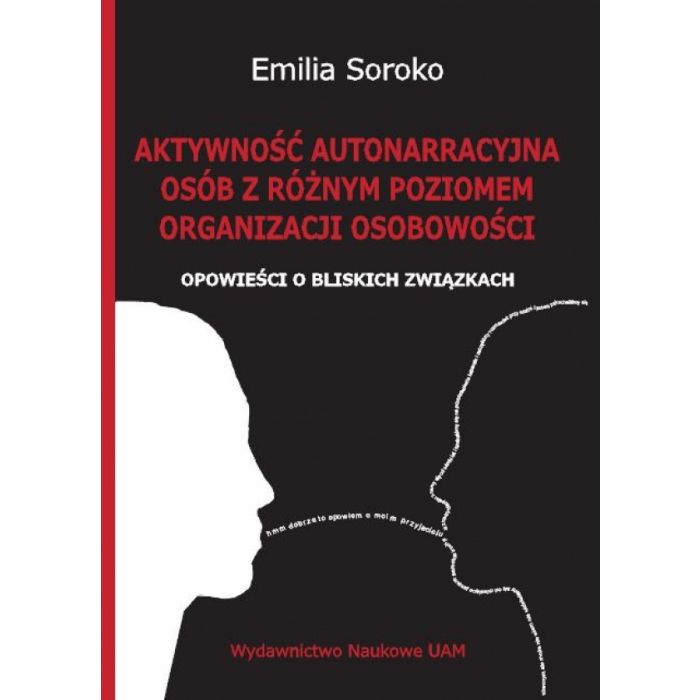Aktywność autonarracyjna osób o różnych poziomach organizacji osobowości. Opowieści o bliskich związkach
- In Stock: out of stock
- ISBN: 978-83-232-2772-4
- Category: Psychology and Education
- Year of publication: 2014
Tematyka książki znajduje się na styku kilku subdyscyplin w obszarach psychologii narracyjnej, psychologii klinicznej, psychopatologii i psychodiagnostyki. Do pogłębienia rozumienia problematyki patologii osobowości, a ściślej problematyki doświadczenia relacyjnego u osób o różnym poziomie organizacji osobowości (według koncepcji Kernberga), zastosowano podejście narracyjne, które dostarcza zarówno konceptualizacji, pozwalającej prześledzić procesy opracowywania doświadczenia, jak i narzędzi do zbierania wypowiedzi autobiograficznych ustrukturowanych narracyjnie i ich analizy.
W książce Autorka stawia pytanie, jak osoby o różnym poziomie organizacji osobowości opracowują doświadczenie relacyjne i udziela na nie odpowiedzi, wykorzystując podejście narracyjne w trojaki sposób: 1) zbierając wypowiedzi autobiograficzne ustrukturowane narracyjnie (autonarracje) na temat ważnej relacji interpersonalnej, 2) analizując te autonarracje, w celu określenia poziomu oraz typu ich narracyjności oraz 3) odwołując się do wybranych teorii w obszarze psychologii narracyjnej jako znaczących źródeł informacji o procesach przetwarzania i integrowania doświadczenia osobistego.
Książka będzie interesująca dla profesjonalistów pracujących z pacjentami – psychologów klinicznych, psychoterapeutów – jak również dla studentów, stanowiąc wprowadzenie do klinicznej psychologii narracyjnej.
This book touches upon several branches of psychology: narrative psychology, clinical psychology, psychopathology, and psychological diagnosis. The narrative approach was employed in order to deepen the understanding of personality pathology, especially the problem of processing relational (emotional) experience by people with different levels of personality functioning as seen from Kernberg's psychodynamic point of view, i.e. borderline, neurotic, and integrated levels of personality organization. The narrative
approach made it possible to conceptualize experiential processing (a model of the narrative processing of experience) and provided tools for collecting autobiographical stories (a self-narrative elicitation interview) and analyzing them both qualitatively and quantitatively (lexical as well as content and structural narrativity indices).
The main question that is raised in the book is how people with different levels of personality organization process their relational experience and whether their stories differ in terms of narrativity. Generally speaking, the results of the study show that people with different levels of personality organization display different levels of narrativity of the utterances they produce about their important relationships. For instance, the stories of people with borderline personality organization are less other-oriented, less coherent and less integrated, but at the same time, their speech is more dynamic and their selves are presented as more active than those of people with integrated personality. Moreover, neurotic personality organization seems to be characterized by higher indices of structure and orientation as compared to borderline personality organization. The results are discussed in light of narrative and psychoanalytic theories.
| Detailed information | |
|---|---|
| Spis treści |
Download file

|
|
|
|
| Publication Version | printed |
| Format | 17,0 x 24,0 |
| Title (EN) | Self-narratives of persons with different levels of personality organization: Stories about close relationships |
| Type of publication | Monografia |
| Edition | I |
| Series | Psychologia nr 14 |
| ISSN | 1898-0473 |
| ISBN | 978-83-232-2772-4 |
| Number of pages | 280 |
| Number of publishing sheets | 17,00 |
| Type of binding | paperback |
